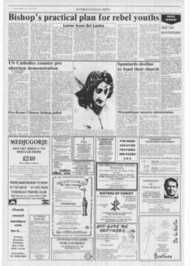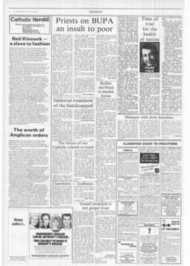Page 5, 14th April 1989
Page 5

Report an error
Noticed an error on this page?If you've noticed an error in this article please click here to report it.
Tags
Share
Related articles
Jesus In The Back Row Of The Pews
Father David Mcgough
Mehall Shares St Matthew S Surprise
Church's Stormy Days
Pharisees That Lurk In Us All
Christ called to Him those who were rejected by the
Pharisees and their church, and pushed to the back row of the pews. In a new series we talk to those whose personal circumstances have brought them into conflict with today's Church. This week Joanna Moorhead talks to David (below), a homosexual Catholic, and (right) we hear of official teaching.
`How canyou call my life a sin?'
HOW can you be gay and Catholic? That's the issue, says David, which is often most difficult to explain to his homosexual friends. "They just can't believe I can remain a Catholic. They say to me, how can you still be a part of that organisation after what it's done to us?"
Unhelpful to downright inhumane is the usual range of attitudes across the Catholic Church spectrum to homosexuality, according to David (not his real name), a 32-year-old London-based musician. He knows what he's talking about, too — for two years, he was a volunteer on the switchboard of Quest, the pastoral organisation for gay Catholics.
"Sometimes a person would phone up and be absolutely amazed that he could talk to another Catholic about being gay. All he'd ever experienced in his dealings with the Church in the past had been negative . . . so much so that he wouldn't dream of, say, going to a priest to talk about it.
"Lots of gays have had bad treatment in the confessional, too. Some have gone in and said they are living with someone and had the book thrown at them. Others have been refused absolution unless they promised never to have a homosexual relationship again.
"There's often no understanding of what's going on for the person concerned, no humanity or comprehension of his or her situation. Priests tell gays they are damned, that they must renounce their homosexuality, but you don't choose to be gay. It's not an option you're presented with; it's something that comes from within."
David, though, has been luckier than his friends in his dealings with the Church. Realisation that he was homosexual didn't dawn until he was in his twenties, and by then he already had enough "good" experiences of Catholicism to know it was worth holding on to his faith, whatever happened.
"Unlike many people, I didn't have religion shoved down my throat or presented in a frightening way at school, and then at university I got on well with the chaplains, "I was never very attracted to girls, and then when I was still quite young I read a Church pamphlet which said if you didn't like women it might be that you were being called to the priesthood! I thought perhaps I was — to be serious, I had thought about it for a while — so I joined the Rosminians as a novice."
He stayed with the order for nine months. "It was a marvellous time in my life. It allowed me to explore where my faith was rooted and provided me with a well of spiritual experience for many years afterwards. "Most importantly, it meant I had plenty of time to spend in prayer and so I established a relationship with God, not just one with the Church. The Church became simply a servant to me, helping to sustain me, but not the only way 1 could talk to God."
After finding the Rosminian life was not for him, David moved to London. "I decided there were parts of myself I had kept hidden, parts I had never found out about, and thought I would start looking at them. Around that time, I happened to see an advert for Quest and wondered if I should go along to a meeting — it took me six months before I plucked up courage to actually do it, though.
"I can see some people might think it strange that I turned to a Catholic gay group, but it just seemed the right thing for me.
"Around the same time, I got to know a gay couple through my involvement with an ecumenical Church music group. They lived together, but were ordinary Christian people — to see them managing to live their faith, yet also be gay, was a revelation to me. At last 1 knew I had the confidence to stand up and say 'I'm gay', because 1 knew 1, too, could combine it with Christian living."
David's considerable musical talents mean he has become more and more involved in the Church over the years. His diverse commitments include work with a leading Catholic Church organisation and teaching and liturgy work for groups, retreats and in seminaries.
"On the whole my sexuality hasn't brought problems for me in the work 1 do, but I know lots of people in more visible positions in Catholic organisations who have to keep quiet about being gay. Teachers in Catholic schools can't be open about it either — any who 'come out' know they risk losing their jobs."
Many individual priests and nuns, of course, try to make their own amends for Rome's unbending condemnation of homosexuality. David knows gay couples who have exchanged rings and vows in "marriage" services. "There are priests around who will help with that it's a case of knowing who to go to", he says.
His own partner is Graham, a 45-year old divorced father whose 17-year old daughter often comes to stay at the couple's west London flat. They have been together for six years. It's a monogamous relationship, the two care deeply for one another, and David refuses to believe it could be sinful.
"My understanding is that when two or more people gather together and ask God to be there, He will be. Well, we've invited God into our relationship. We're giving something to each other, and neither of us is being used. How can that be called a sin?". RECENTLY in the Church a particular way of talking about homosexuals has become popular. Talk of perversion, sins against nature, and so on, has been less to the fore, giving way to a quasi-medical vocabulary, and a way of talking about gay people has developed which is more consonant with modern thinking.
Now they are not so much wicked as sick; they suffer from something call "the homosexual condition". It is not so much that they commit horrible and disgusting sins as that, unfortunately and through no fault of their own, they have a tendency or disposition to perform such acts. It is still a morally bad thing if they actually give way to this tendency, but it is not sinful that they have it; it is like a tumour in their moral insides.
Thus homosexuality was described as a "condition" in the 1975 Vatican Declaration on Sexual Ethics: "A distinction is drawn . . , between homosexuals whose tendency is . transitory or at least not incurable: and homosexuals who are definitely such because of some kind of innate instinct or a pathological constitution judged to be incurable."
There are many kinds of condition; we speak of social conditions, economic conditions, conditions of hygiene, and so on. But here it is the medical condition that is being taken as a model for homosexuality. That is clear from the reference to possibilities of cure and to "pathological constitution".
This kind of language was taken up in the Ratzinger letter of 1986. It says: "In the discussion which followed the publication of the Declaration, however, an overly benign interpretation was given to the homosexual condition itself, some going so far as to call it neutral, or even good. Although the particular inclination of the homosexual person is not a sin, it is a more or less strong tendency ordered toward an intrinsic moral evil; and thus the inclination itself must be seen as an objective disorder. Therefore special concern and pastoral attention should be directed towards those who have this condition, lest they be led to believe that the living out of this orientation in homosexual activity is a morally acceptable option. It is not."
Once again, reference to "those who have this condition" makes it clear that a medical model is being followed, albeit one with moral overtones.
There can be no doubt that the motives behind the introduction of this kind of language arc good. First, it enables a clear distinction to be drawn between homosexual acts and homosexual tendencies. This relieves people of any burden of guilt for having homosexual tendencies (provided that they have not brought them upon themselves). If having these tendencies is properly thought of as analogous to a medical condition, like a tendency to come out in spots or develop fevers, then you are not blameworthy for having them, any more than you are for having malaria. People who have homosexuality are not therefore to be persecuted or belittled, either by themselves or by others. Neither are they to be marginalised, but accepted fully and lovingly into the community of the Church.
Secondly, the change seeks to
blog comments powered by Disqus













